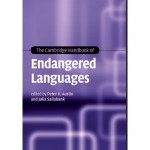
The Cambridge Handbook of Endangered Languages edited by Julia Sallabank and myself will be available in the UK next week (and in Australia in June). The book is being launched by Mari Jones at the conference on Language Endangerment: Documentation, Pedagogy, and Revitalization at Cambridge on 25th March.
The Handbook covers issues in linguistic diversity and language endangerment, language documentation and archiving, revitalisation and language support, and challenges faced by endangered languages now and in the future. The volume is intended to be accessible both to specialists and non-specialists: researchers will find cutting-edge contributions from acknowledged experts in their fields, while students, activists and other interested readers will find a wealth of readable yet thorough and up-to-date information.
The chapters in the Handbook are as follows:
- Introduction – Peter K. Austin and Julia Sallabank
- Language ecology and endangerment – Lenore A. Grenoble
- Speakers and communities – Colette Grinevald and Michel Bert
- A survey of language endangerment – David Bradley
- Language contact and change in endangered languages – Carmel O’Shannessy
- Structural aspects of language endangerment – Naomi Palosaari and Lyle Campbell
- Language and culture – Lev Michael
- Language and society – Bernard Spolsky
- Language documentation – Anthony C. Woodbury
- Speakers and language documentation – Lise M. Dobrin and Josh Berson
- Data and language documentation – Jeff Good
- Archiving and language documentation – Lisa Conathan
- Digital archiving – David Nathan
- Language policy for endangered languages – Julia Sallabank
- Revitalization of endangered languages – Leanne Hinton
- Orthography development – Friederike Lüpke
- Lexicography in endangered language communities – Ulrike Mosel
- Language curriculum design and evaluation for endangered languages – Serafin M. Coronel-Molina and Teresa L. McCarty
- The role of information technology in supporting minority and endangered languages – Gary Holton
- Endangered languages and economic development – Wayne Harbert
- Researcher training and capacity development in language documentation – Anthony Jukes
- New roles for endangered languages – Máiréad Moriarty
- Planning a language-documentation project – Claire Bowern
The handbook is completed by an extensive bibliography and indexes of topics and languages.
 Follow
Follow
The Cambridge Handbook of Endangered Languages is now available as an e-book from Amazon UK at 34% off the price of the hardback version.